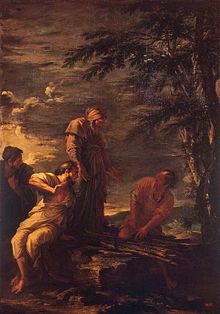Protagoras
Protagoras (Πρωταγόρας) | |
|---|---|
 Democritus (center) and Protagoras (right) by Salvator Rosa | |
| Era | Pre-Socratic philosophy |
| Region | Western Philosophy |
| School | Ionian Philosophy |
Main interests | language, semantics, relativism |
Notable ideas | The "Antilogies", which consists of two premises: the first is "Before any uncertainty two opposite theses can validly be confronted", the second is its complement: the need to "strengthen the weaker argument". |
Influenced | |
Protagoras (Greek: Πρωταγόρας) (ca. 490–420 BC) was a pre-Socratic Greek philosopher. He is called one of the sophists by Plato, the Greek philosopher who followed Socrates. In Plato's dialogue Protagoras, he credits Protagoras with having invented the role of the professional sophist or teacher of virtue.
Philosophy[change | change source]
It is thought that Protagoras used the phrase "Man is the measure of all things" (Ancient Greek: πάντων χρημάτων μέτρον ἐστὶν ἄνθρωπος). By this, he meant that nothing is absolutely truth, but there are different truths for each person, and each person makes the truth for themselves. For example, one person might go outside on a cold day and feel some water in a bucket, and they will say that the water is warm. And another person might go outside on a hot day and feel the same water, but they will say that the water feels cold to them. Each person is right.
Related pages[change | change source]
Other websites[change | change source]
![]() Quotations related to Protagoras at Wikiquote
Quotations related to Protagoras at Wikiquote
 Diogenes Laërtius, Life of Protagoras, translated by Robert Drew Hicks (1925).
Diogenes Laërtius, Life of Protagoras, translated by Robert Drew Hicks (1925).
